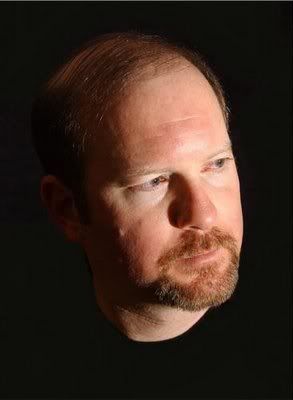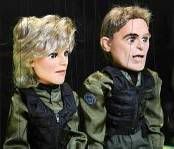http://www.sfx.co.uk/page/sfx?entry=kevin_j_anderson_interview_spin
(Please follow the link for the complete interview.)
Sunday May 25, 2008
Kevin J Anderson interview: spin-off fiction

In SFX recently we've been considering franchise fiction, and the creation of shared universes. For instance, the spin-off Star Trek novels, or the Buffy comics, or the extended Star Wars universe in all its incarnations. Is it easy to be an author in one of these famous universes? Over the next few weeks, exclusively on the SFX website, we'll be publishing Q&As with professional writers who work in this area. First up, meet novelist Kevin J Anderson.
SFX: Let's get this one straight out of the way, franchise fiction is maybe regarded as not creative in the same way that 'original' novels are. What's your take on that?
Kevin J Anderson: "I always find it odd that if an author writes a script for a popular TV show (say, Star Trek or Torchwood) – an original story based in an existing universe using established characters – then that's considered respectable, even exciting. But if an author writes a novel for the same show – also an original story based in an existing universe using established characters – then that's somehow less creative or less respectable. I would argue that writing a 400-page novel is more difficult and creatively challenging than writing a 50-page script, and when the novel gets published, I can proudly take credit for every paragraph, every page. A script, on the other hand, is manhandled by dozens of other people involved in the show, including the director and actors, and by the time the episode airs, it may have little resemblance to the original script."
"Anyone who insists that a writer can't be 'creative' in an established universe must not have much of an imagination. Virtually every work of fiction must be set within an established universe – if my story is set in modern London, then I have a certain culture, street layout, climate, language, and history by which I have to abide. If I choose to write a story set in ancient Japan, then I have the constraints of history to deal with. Does it stifle my creativity as an author because I can't, say, have jet aircraft in medieval Japan? No, I learn the rules of that universe and I set my story within those boundaries. If I write a novel set in the American West, does it stifle my creativity because I can't have the characters encounter dinosaurs? (In science fiction, of course, both of those scenarios are indeed possible.)"
"Writing a story in the Star Wars universe, or The X-Files, or Dune, is no different than writing a story set in medieval Japan. I have to learn the universe, the characters, the rules, and then I write the best novel I can. I have written dozens of my own original novels and dozens of novels set in established universes – I find the work extremely satisfying."
**snippage**
There will be more interviews about media fiction over the course of the next few weeks, so you might want to bookmark our features section. Remember you can read features on this subject in SFX 170 (on sale now) and 171 (on sale from Wednesday 4 June).
Words: Jonathan Wright







No comments:
Post a Comment